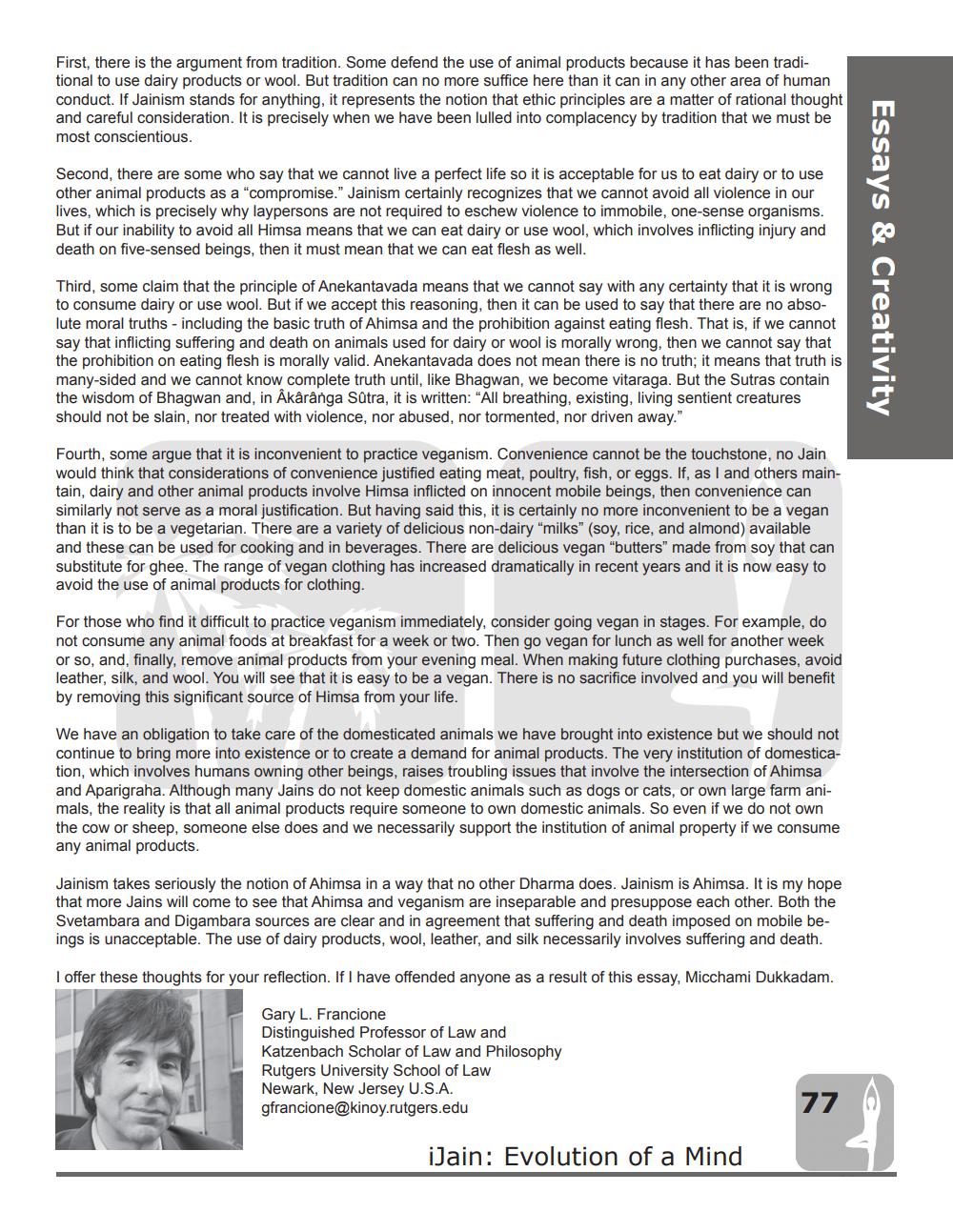________________
First, there is the argument from tradition. Some defend the use of animal products because it has been traditional to use dairy products or wool. But tradition can no more suffice here than it can in any other area of human conduct. If Jainism stands for anything, it represents the notion that ethic principles are a matter of rational thought and careful consideration. It is precisely when we have been lulled into complacency by tradition that we must be most conscientious.
Second, there are some who say that we cannot live a perfect life so it is acceptable for us to eat dairy or to use other animal products as a "compromise." Jainism certainly recognizes that we cannot avoid all violence in our lives, which is precisely why laypersons are not required to eschew violence to immobile, one-sense organisms. But if our inability to avoid all Himsa means that we can eat dairy or use wool, which involves inflicting injury and death on five-sensed beings, then it must mean that we can eat flesh as well.
Essays & Creativity
Third, some claim that the principle of Anekantavada means that we cannot say with any certainty that it is wrong to consume dairy or use wool. But if we accept this reasoning, then it can be used to say that there are no absolute moral truths - including the basic truth of Ahimsa and the prohibition against eating flesh. That is, if we cannot say that inflicting suffering and death on animals used for dairy or wool is morally wrong, then we cannot say that the prohibition on eating flesh is morally valid. Anekantavada does not mean there is no truth; it means that truth is many-sided and we cannot know complete truth until, like Bhagwan, we become vitaraga. But the Sutras contain the wisdom of Bhagwan and, in Akârânga Sutra, it is written: "All breathing, existing, living sentient creatures should not be slain, nor treated with violence, nor abused, nor tormented, nor driven away."
Fourth, some argue that it is inconvenient to practice veganism. Convenience cannot be the touchstone, no Jain would think that considerations of convenience justified eating meat, poultry, fish, or eggs. If, as I and others maintain, dairy and other animal products involve Himsa inflicted on innocent mobile beings, then convenience can similarly not serve as a moral justification. But having said this, it is certainly no more inconvenient to be a vegan than it is to be a vegetarian. There are a variety of delicious non-dairy "milks" (soy, rice, and almond) available and these can be used for cooking and in beverages. There are delicious vegan "butters" made from soy that can substitute for ghee. The range of vegan clothing has increased dramatically in recent years and it is now easy to avoid the use of animal products for clothing.
For those who find it difficult to practice veganism immediately, consider going vegan in stages. For example, do not consume any animal foods at breakfast for a week or two. Then go vegan for lunch as well for another week or so, and, finally, remove animal products from your evening meal. When making future clothing purchases, avoid leather, silk, and wool. You will see that it is easy to be a vegan. There is no sacrifice involved and you will benefit by removing this significant source of Himsa from your life.
We have an obligation to take care of the domesticated animals we have brought into existence but we should not continue to bring more into existence or to create a demand for animal products. The very institution of domestication, which involves humans owning other beings, raises troubling issues that involve the intersection of Ahimsa and Aparigraha. Although many Jains do not keep domestic animals such as dogs or cats, or own large farm animals, the reality is that all animal products require someone to own domestic animals. So even if we do not own the cow or sheep, someone else does and we necessarily support the institution of animal property if we consume any animal products.
Jainism takes seriously the notion of Ahimsa in a way that no other Dharma does. Jainism is Ahimsa. It is my hope that more Jains will come to see that Ahimsa and veganism are inseparable and presuppose each other. Both the Svetambara and Digambara sources are clear and in agreement that suffering and death imposed on mobile beings is unacceptable. The use of dairy products, Wool, leather, and silk necessarily involves suffering and death.
I offer these thoughts for your reflection. If I have offended anyone as a result of this essay, Micchami Dukkadam.
Gary L. Francione Distinguished Professor of Law and Katzenbach Scholar of Law and Philosophy Rutgers University School of Law Newark, New Jersey U.S.A.
[email protected]
iJain: Evolution of a Mind
